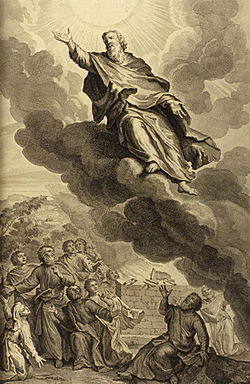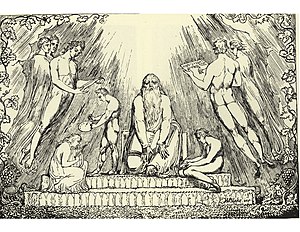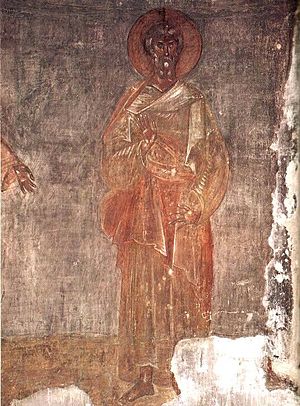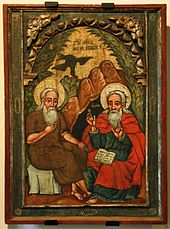Enoch
Enoch the Patriarch | |
|---|---|
 God took Enoch, as in Genesis 5:24: "And Enoch walked with God, and he was not; for God took him".[1] illustration from the 1728 Figures de la Bible; illustrated by Gerard Hoet | |
| Antediluvian Patriarch | |
| Born | 622 AM Babylon |
| Died | 987 AM ("taken up by God" as per traditions) |
| Venerated in | Christianity[i] Islam Judaism[ii] New religious movements[iii] |
| Feast | Sunday[iv] before the Nativity of Christ in the Eastern Orthodox Church 22 January in the Coptic Church 19 July (his assumption in the Coptic Church) 3 January (Bollandists)[2] |
Enoch (/ˈiːnək/ ⓘ)[note 1] is a biblical figure and patriarch prior to Noah's flood, and the son of Jared and father of Methuselah. He was of the Antediluvian period in the Hebrew Bible.
The text of the Book of Genesis says Enoch lived 365 years before he was taken by God. The text reads that Enoch "walked with God: and he was no more; for God took him" (Gen 5:21–24), which is interpreted as Enoch entering heaven alive in some Jewish and Christian traditions, and interpreted differently in others.[citation needed]
Enoch is the subject of many Jewish and Christian traditions. He was considered the author of the Book of Enoch[3] and also called the scribe of judgment.[4] In the New Testament, Enoch is referenced in the Gospel of Luke, the Epistle to the Hebrews, and in the Epistle of Jude, the last of which also quotes from it.[5] In the Catholic Church, Eastern Orthodoxy, and Oriental Orthodoxy, he is venerated as a Saint. Some Muslims identify Enoch with Idris and consider him a prophet due to the Quran's recognition of Idris as a prophet.
The name of Enoch (Hebrew: חֲנוֹךְ Ḥănōḵ) derives from the Hebrew root חנך (ḥ-n-ḵ), meaning to train, initiate, dedicate, inaugurate,[6] with חֲנוֹךְ/חֲנֹךְ (Ḥănōḵ) being the imperative form of the verb.[7][8]
Book of Genesis[edit]
Enoch appears in the Book of Genesis of the Pentateuch as the seventh of the ten pre-Deluge Patriarchs. Genesis recounts that each of the pre-Flood Patriarchs lived for several centuries. Genesis 5 provides a genealogy of these ten figures (from Adam to Noah), providing the age at which each fathered the next, and the age of each figure at death. Enoch is considered by many to be the exception, who is said to "not see death" (Hebrews 11:5). Furthermore, Genesis 5:22–24 states that Enoch lived for 365 years, which is shorter than other pre-Flood Patriarchs, who are all recorded as dying at over 700 years of age. The brief account of Enoch in Genesis 5 ends with the cryptic note that "he was not; for God took him".[9] This happens 57 years after Adam's death and 69 years before Noah's birth.
Books of Enoch (Apocryphal)[edit]

Three extensive Apocrypha are attributed to Enoch:
- The Book of Enoch (aka 1 Enoch), composed in Hebrew or Aramaic and preserved in Ge'ez, first brought to Europe by James Bruce from Ethiopia and translated into English by August Dillmann and Reverent Schoode[10] – recognized by the Orthodox Tewahedo churches and usually dated between the third century BC and the first century AD.
- 2 Enoch (aka Book of the Secrets of Enoch), preserved in Old Church Slavonic, and first translated in English by William Morfill[11] – usually dated to the first century AD.
- 3 Enoch, a Rabbinic text in Hebrew usually dated to the fifth century AD.
These recount how Enoch was taken up to Heaven and was appointed guardian of all the celestial treasures, chief of the archangels, and the immediate attendant on the Throne of God. He was subsequently taught all secrets and mysteries and, with all the angels at his back, fulfils of his own accord whatever comes out of the mouth of God, executing His decrees. Some esoteric literature, such as 3 Enoch, identifies Enoch as Metatron, the angel which communicates God's word. In consequence, Enoch was seen, by this literature and the Rabbinic kabbalah of Jewish mysticism, as the one who communicated God's revelation to Moses, and, in particular, as the dictator of the Book of Jubilees.
In Book of Giants[edit]
The Book of Giants is a Jewish pseudepigraphal work from the third century BC and resembles the Book of Enoch. Fragments from at least six and as many as eleven copies were found among the Dead Sea Scrolls collections.[12]
Septuagint[edit]
The third-century BC translators who produced the Septuagint in Koine Greek rendered the phrase "God took him" with the Greek verb metatithemi (μετατίθημι)[13] meaning moving from one place to another.[14] Sirach 44:16, from about the same period, states that "Enoch pleased God and was translated into paradise that he may give repentance to the nations." The Greek word used here for paradise, paradeisos (παράδεισος), was derived from an ancient Persian word meaning "enclosed garden", and was used in the Septuagint to describe the garden of Eden. Later, however, the term became synonymous for heaven, as is the case here.[15]
In Classical Rabbinism[edit]
In classical Rabbinical literature, there are various views of Enoch. One view regarding Enoch that was found in the Targum Pseudo-Jonathan, which thought of Enoch as a pious man, taken to Heaven, and receiving the title of Safra rabba (Great scribe). After Christianity was completely separated from Judaism, this view became the prevailing rabbinical idea of Enoch's character and exaltation.[16]
According to Rashi[17] [from Genesis Rabbah[18]], "Enoch was a righteous man, but he could easily be swayed to return to do evil. Therefore, the Holy One, blessed be He, hastened and took him away and caused him to die before his time. For this reason, Scripture changed [the wording] in [the account of] his demise and wrote, 'and he was no longer' in the world to complete his years."
Among the minor Midrashim, esoteric attributes of Enoch are expanded upon. In the Sefer Hekalot, Rabbi Ishmael is described as having visited the Seventh Heaven, where he met Enoch, who claims that earth had, in his time, been corrupted by the demons Shammazai, and Azazel, and so Enoch was taken to Heaven to prove that God was not cruel.[16] Similar traditions are recorded in Sirach. Later elaborations of this interpretation treated Enoch as having been a pious ascetic, who, called to mix with others, preached repentance, and gathered (despite the small number of people on Earth) a vast collection of disciples, to the extent that he was proclaimed king. Under his wisdom, peace is said to have reigned on earth, to the extent that he is summoned to Heaven to rule over the sons of God.
In Christianity[edit]

New Testament[edit]
The New Testament contains three references to Enoch.
- The first is a brief mention in one of the genealogies of the ancestors of Jesus in the Gospel of Luke. (Luke 3:37).
- The second mention is in the Epistle to the Hebrews which says, "By faith Enoch was translated that he should not see death; and was not found, because God had translated him: for before his translation he had this testimony, that he pleased God." (Hebrews 11:5 KJV). This suggests he did not experience the mortal death ascribed to Adam's other descendants, which is consistent with Genesis 5:24 KJV, which says, "And Enoch walked with God: and he [was] not; for God took him."
- The third mention is in the Epistle of Jude (1:14–15) where the author attributes to "Enoch, the Seventh from Adam" a passage not found in Catholic and Protestant canons of the Old Testament. The quotation is believed by most modern scholars to be taken from 1 Enoch 1:9 which exists in Greek, in Ge'ez (as part of the Ethiopian Orthodox canon), and also in Aramaic among the Dead Sea Scrolls.[19][20] Though the same scholars recognise that 1 Enoch 1:9 itself is a midrash of Deuteronomy 33:2.[21][22][23][24][25]
The introductory phrase "Enoch, the Seventh from Adam" is also found in 1 Enoch (1 En. 60:8), though not in the Old Testament.[26] In the New Testament this Enoch prophesies "to"[note 2] ungodly men, that God shall come with His holy ones to judge and convict them (Jude 1:14–15).
Influence in Christianity[edit]

The Book of Enoch was excluded from both the Hebrew Tanakh and the Greek translation of the Hebrew Bible, the Septuagint. It was not considered canon by either Jewish or early Christian readers. Church Fathers such as Justin Martyr, Athenagoras of Athens, Irenaeus, Clement of Alexandria, Origen, Tertullian, and Lactantius all speak highly of Enoch and contain many allusions to the Book of Enoch as well as in some instances advocating explicitly for the use of the Book of Enoch as Scripture.[30][31][32][33][34][35]
The letter of Jude's citation of the Book of Enoch as prophetic text encouraged acceptance and usage of the Book of Enoch in early Christian circles. The main themes of Enoch about the Watchers corrupting humanity were commonly mentioned in early literature. This positive treatment of the Book of Enoch was associated with millennialism which was popular in the early Church. When amillennialism began to be common in Christianity, the Book of Enoch, being incompatible with amillennialism, came to be widely rejected. After the split of the Oriental Orthodox Church from the Catholic Church in the 5th century, use of the Book of Enoch was limited primarily to the Oriental Orthodox Church. Eventually, the usage of the Book of Enoch became limited to Ethiopian circles of the Oriental Orthodox Church.
Another common element that some Church Fathers, like John of Damascus, spoke of, was that they considered Enoch to be one of the two witnesses mentioned in the Book of Revelation. This view still has many supporters today in Christianity.

In Mormonism[edit]
Among the Latter Day Saint movement and particularly in the Church of Jesus Christ of Latter-day Saints, Enoch is viewed as having founded an exceptionally righteous city, named Zion, in the midst of an otherwise wicked world. This view is encountered in the standard works, the Pearl of Great Price and the Doctrine and Covenants, which states that not only Enoch, but the entire peoples of the city of Zion, were taken off this earth without death, because of their piety. (Zion is defined as "the pure in heart" and this city of Zion will return to the earth at the Second Coming of Jesus.) The Doctrine and Covenants further states that Enoch prophesied that one of his descendants, Noah, and his family, would survive a Great Flood and thus carry on the human race and preserve the Scripture. The Book of Moses in the Pearl of Great Price includes chapters that give an account of Enoch's preaching, visions, and conversations with God. They provide details concerning the wars, violence and natural disasters in Enoch's day, but also reference the miracles performed by Enoch.
The Book of Moses is itself an excerpt from Joseph Smith's translation of the Bible, which is published in full, complete with these chapters concerning Enoch, by Community of Christ, in the Joseph Smith Translation of the Bible, where it appears as part of the Book of Genesis. D&C 104:24 (CofC) / 107:48–49 (LDS) states that Adam ordained Enoch to the higher priesthood (now called the Melchizedek, after the great king and high priest) at age 25, that he was 65 when Adam blessed him, and that he lived for an additional 365 years until he and his city were blessed, making Enoch 430 years old at the time that "he was not, for God took him" (Genesis 5:24).
Additionally in LDS theology, Enoch is implied to be the scribe who recorded Adam's blessings and prophecies at Adam-ondi-Ahman, as recorded in D&C 107:53–57 (LDS) / D&C 104:29b (CofC).
Other religions[edit]
In Islam[edit]
Some Muslims identify Enoch with Idris and consider him a prophet due to the Quran's recognition of Idris as a prophet. However, some research suggests that the Greek version of the name Ezra (Esdras) is the most plausible origin for the name Idris because it is etymologically much closer to Idris. In Apocalyptic Ezra tradition, it is mentioned that Ezra was taken up to heaven, similar to Enoch. This corresponds with the information about Idris found in Muslim Israʼiliyyat traditions. It appears that later Muslims, due to the similarities between the two characters, confused Idris with Enoch. P. Casanova and C. C. Torrey also suggest that Idris originated from the biblical Ezra, who came to Muslims through the Greek version, Esdras.
In Theosophy[edit]
According to the theosophist Helena Blavatsky, the Jewish Enoch (or the Greek demigod Hermes[36]) was "the first Grand Master and Founder of Masonry."[37]
In Samaritanism[edit]
According to the Asatir, Enoch was buried in Mount Ebal.[38]
In Mesopotamia[edit]
Enmeduranki was an ancient Sumerian pre-dynastic king who some consider to be a Mesopotamian model for Enoch. Enmeduranki appears as the seventh name on the Sumerian King List, whereas Enoch is the seventh figure on the list of patriarchs in Genesis. Both of them were also said to have been taken up into heaven. Additionally, Sippar, the city of Enmeduranki, is associated with sun worship, while the 365 years that Enoch is stated to have lived may be linked to the number of days in the solar calendar.[39]
Genealogy[edit]
- ^ a b c Genesis 4:1
- ^ Genesis 4:2
- ^ Genesis 4:25; 5:3
- ^ Genesis 4:17
- ^ Genesis 4:26; 5:6–7
- ^ a b c d Genesis 4:18
- ^ Genesis 5:9–10
- ^ Genesis 5:12–13
- ^ Genesis 5:15–16
- ^ a b Genesis 4:19
- ^ Genesis 5:18–19
- ^ Genesis 4:20
- ^ Genesis 4:21
- ^ a b Genesis 4:22
- ^ Genesis 5:21–22
- ^ Genesis 5:25–26
- ^ Genesis 5:28–30
- ^ a b c Genesis 5:32
See also[edit]
References[edit]
Notes[edit]
- ^ Hebrew: חֲנוֹךְ, Modern: H̱anōḵ, Tiberian: Ḥănōḵ; Greek: Ἑνώχ Henṓkh; Arabic: أَخْنُوخ ʼAkhnūkh
- ^ The use of dative toutois in the Greek text (προεφήτευσεν δὲ καὶ τούτοις instead of the normal genitive with προφητεύω prophēteuō peri auton, "concerning them") has occasioned discussion among commentators including: Ben Witherington,[27] John Twycross,[28] and Cox S.[29]
- ^ Catholic Church
Oriental Orthodoxy
Eastern Orthodoxy
Enochian Christian sects (see John Dee) - ^ Medieval Rabbinical Judaism
- ^ Baháʼí Faith
New Age cults devoted to angelology - ^ 30 July
Citations[edit]
- ^ Genesis 5:18–24
- ^ "Enoch the Patriarch". 27 November 2018.
- ^ August Dillmann and R. Charles (1893). The Book of Enoch, translation from Geez.
- ^ 1Enoch, chap. 12
- ^ Luke 3:37, Hebrews 11:5, Jude 1:14–15
- ^ "Strong's Hebrew Concordance - 2596. chanak". Bible Hub.
- ^ "Strong's Hebrew Concordance - 2596. ḥănōḵ". Bible Hub.
- ^ "Conjugation of לַחֲנוֹךְ". Pealim.
- ^ Genesis 5:24, KJV
- ^ Schodde, George H (1882). The Book of Enoch (PDF).
- ^ "MORFILL – The Book of the Secrets of Enoch (1896)" (PDF).
- ^ Eisenman, Robert; Wise, Michael (1992). The Dead Sea Scrolls Uncovered (6 ed.). Shaftesbury, Dorset: Element Books, Inc. p. 95. ISBN 1852303689.
- ^ 5:24 καὶ εὐηρέστησεν Ενωχ τῷ θεῷ καὶ οὐχ ηὑρίσκετο ὅτι μετέθηκεν αὐτὸν ὁ θεός
- ^ LSJ metatithemi
- ^ G3857 παράδεισος Strong's Greek Lexicon. Retrieved 2015-08-01
Strong's Greek 3857_ παράδεισος (paradeisos) – a park, a garden, a paradise Retrieved 2015-08-01 - ^ a b "Jewish Encyclopedia Enoch". Jewishencyclopedia.com. Retrieved 2014-03-26.
- ^ Rashi's Commentary on Genesis 5:24. See also Commentary of Ibn Ezra.
- ^ 25:1
- ^ 4Q Enoch (4Q204[4QENAR]) COL I 16–18
- ^ Clontz, T.E. and J., "The Comprehensive New Testament with complete textual variant mapping and references for the Dead Sea Scrolls, Philo, Josephus, Nag Hammadi Library, Pseudepigrapha, Apocrypha, Plato, Egyptian Book of the Dead, Talmud, Old Testament, Patristic Writings, Dhammapada, Tacitus, Epic of Gilgamesh", Cornerstone Publications, 2008, p. 711, ISBN 978-0-9778737-1-5
- ^ "The initial oracle in chapters 1–5 is a paraphrase of part of Deuteronomy 33,24" George W. E. Nickelsburg, The nature and function of revelation 1 Enoch, Jubilees and some Qumranic documents, 1997
- ^ Lars Hartman, Asking for a Meaning: A Study of 1 Enoch 1–5 ConBib NT Series 12 Lund Gleerup, 1979 22–26.
- ^ George WE Nickelsburg & James C Vanderkam, 1 Enoch, Fortress 2001
- ^ R.H. Charles, The Book of Enoch, London SPCK, 1917
- ^ E. Isaac, 1 Enoch, a new Translation and Introduction in Old Testament Pseudepigrapha ed. Charlesworth, Doubleday 1983–85
- ^ Richard Bauckham Jude and the relatives of Jesus in the early church p206 etc.
- ^ Ben Witherington, Letters and Homilies for Jewish Christians: A Socio-Rhetorical Commentary on Hebrews, James and Jude: "who might be tempted to follow the teachers' example), nonetheless, Jude says that this prophecy refers to these (toutois) false teachers in Jude 14" p624
- ^ John Twycross, The New Testament in the original Greek: with notes by C. Wordsworth His warning is addressed to them as well to those of his own and future ages. p140
- ^ Cox S., Slandering Celestial Beings Hyderabad 2000 "..but instead Jude wrote proepheteusen toutois (verb + dative case pronoun plural) "prophesied TO these men".." p16
- ^ "ANF01. The Apostolic Fathers with Justin Martyr and Irenaeus - Christian Classics Ethereal Library". www.ccel.org.
- ^ "ANF02. Fathers of the Second Century: Hermas, Tatian, Athenagoras, Theophilus, and Clement of Alexandria (Entire) - Christian Classics Ethereal Library". www.ccel.org.
- ^ "ANF01. The Apostolic Fathers with Justin Martyr and Irenaeus - Christian Classics Ethereal Library". www.ccel.org.
- ^ "0150-0215 - Clemens Alexandrinus - Eclogae propheticae - Graecum Text - Lexicum Proprium seu 'Concordance'". www.documentacatholicaomnia.eu.
- ^ "ANF03. Latin Christianity: Its Founder, Tertullian - Christian Classics Ethereal Library". www.ccel.org.
- ^ "ANF04. Fathers of the Third Century: Tertullian, Part Fourth; Minucius Felix; Commodian; Origen, Parts First and Second - Christian Classics Ethereal Library". www.ccel.org.
- ^ Helena Blavatsky (June 1, 1885). "Lamas and Druses". Ancient Survivals and Modern Errors. Bangalore: Theosophy Company (Mysore) Private Ltd. p. 12 – via Internet Archive.
- ^ Helena Blavatsky (1981). "The Eight Wonder by an Unpopular Philosopher (written in 188⁹)". Ancient Science, Doctrine and Beliefs. Bangalore: Theosophy Company (Mysore) Private LTD. p. 33 – via Internet Archive. (Lucifer, October, 1791)
- ^ The Asatir, Moses Gaster (ed.), The Royal Asiatic Society: London 1927, p. 208
- ^ John Day (2021), From Creation to Abraham: Further Studies in Genesis 1-11. Bloomsbury Publishing. p.106
External links[edit]
- The Descendants of Adam, The Legacy of Cain, The Souls Elijah and Enoch
- Catholic Encyclopedia Henoch (1914)
- Andrei A. Orlov essays on 2 Enoch: Enoch as the Heavenly Priest, Enoch as the Expert in Secrets, Enoch as the Scribe and Enoch as the Mediator
- Ed. Philip P. Wiener Dictionary of the History of Ideas: Cosmic Voyages (1973)
- Dr. Reed C. Durham, Jr. Comparison of Masonic legends of Enoch and Mormon scriptures description of Enoch (1974)
